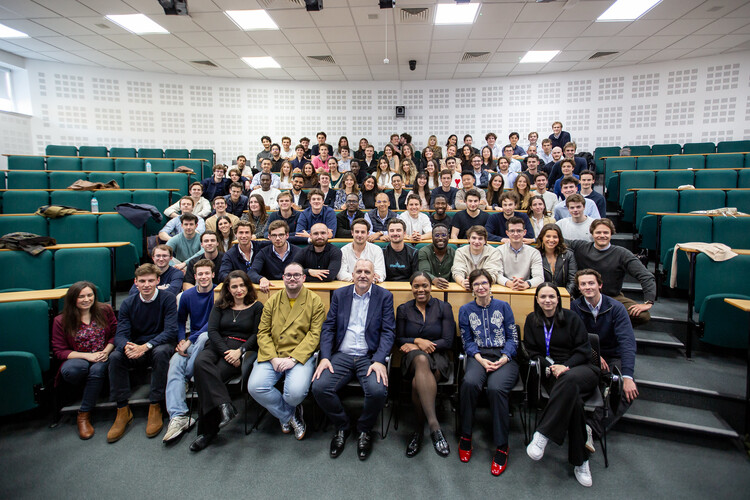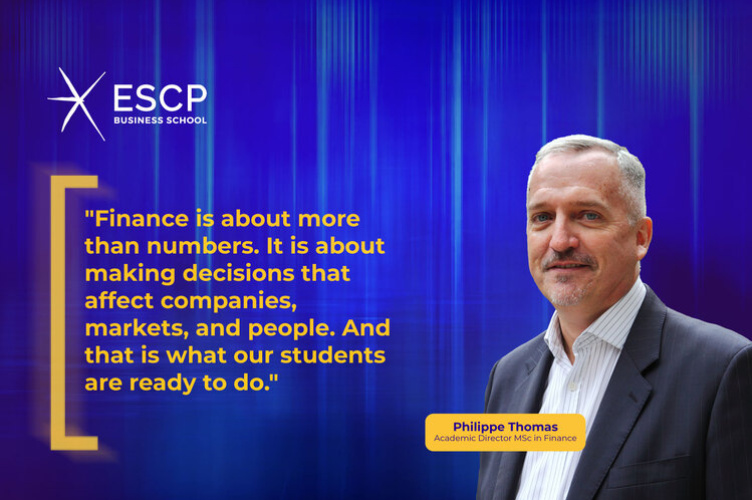Inside ESCP’s #1-Ranked Master in Finance:
How the Programme Prepares the Leaders the Industry Needs Next
In conversation with Professor Philippe Thomas, Academic Director of the Master in Finance Programme
For all its models and forecasts, finance remains a discipline shaped by uncertainty. Markets fluctuate, technologies disrupt, and global risks arrive in forms that textbooks can’t quite anticipate. What distinguishes tomorrow’s finance leaders is not just technical skill. It is the capacity to navigate complexity across systems, borders, and within ethical boundaries.
That belief is what shapes ESCP’s Master in Finance (MSc), ranked the world’s #1 pre-experience finance programme by the Financial Times for the third year in a row. We spoke to Professor Philippe Thomas, Academic Director of the programme, about preparing graduates to meet the demands of a world in flux.
Building more than technical mastery
“After a rigorous selection process, our students follow a ‘plug and play’ programme, enabling them to quickly enter the world of finance,” says Thomas. "Our strategy consists of applied courses, instilling knowledge of bank expectations, intense training in recruitment processes, the development of soft skills, and significant individualised support to the students."
In addition to core studies, students complete a four-month internship and defend a final Master’s thesis grounded in academic research. “Beyond instilling the foundations of finance, our priority is to prepare well-rounded professionals,” says Thomas. “Soft skills have been a part of the programme for more than 10 years and continue to be improved every year as we see them as an essential element to our graduates' future success.”
An international experience, a tailored curriculum
Over 14 months, split between Paris and London, students gain exposure in two of the world’s leading financial centres. This structure mirrors industry expectations—nearly 70% of graduates take on roles with an international dimension. The Financial Times also ranks the programme #2 worldwide for international course experience and #3 for international work mobility.
Students personalise their experience through specialisations in Corporate Investment Banking, Financial Markets, or the fully English-taught Global Track. They learn alongside peers from diverse cultural and academic backgrounds—encompassing engineering, life sciences, literature, and the social sciences—bringing rich perspectives to the classroom.
ESCP’s alumni network helps the programme evolve with industry shifts. "We are in constant contact with our alumni—both recent graduates and those now leading major institutions," says Thomas. "50% of the programme is taught by industry professionals."
Outcomes reflect this alignment: 100% of graduates are employed within three months of graduation, with 97% reporting their career aims were achieved, and overall programme satisfaction rated at an exceptional 9.99 out of 10, according to the Financial Times.

Finance for a sustainable future
Sustainability is fully integrated into the programme—a reflection of ESCP’s values and market demand. "This is a universal issue for society," says Thomas. "The programme fully integrates ESG principles as this is one of ESCP’s core values. It is important for our students, and it is also one of the banks’ requirements."
Core courses include financial economics as well as ethics and business conduct. ESG thinking informs discussions on investment strategy, valuation, and corporate leadership. "We need to be sure that students understand these values. We provide conceptual training that gives them perspective, general background courses, and we take the time to discuss these subjects collectively," says Thomas.
This approach aligns with the broader direction of the industry. Firms expect graduates to combine technical excellence with ethical judgement and an understanding of systemic risks—from climate change to regulatory shifts.
Graduates equipped for a changing world
The financial sector is entering a period of profound change. "Students must be ready to consider different issues, and we prepare them for this," says Thomas. "The jobs will change in the future, the use of AI is growing, compliance with ESG principles is critical—above all, we cultivate a philosophy, a state of mind, and values."
As Thomas notes, the goal of the programme is to balance technical rigour with an understanding of broader impacts. “Finance is about more than numbers. It is about making decisions that affect companies, markets, and people. And that is what our students are ready to do.”
Relevant links
Campuses
